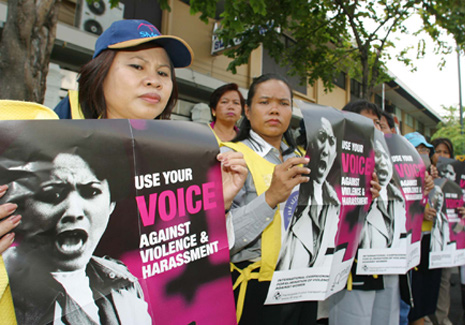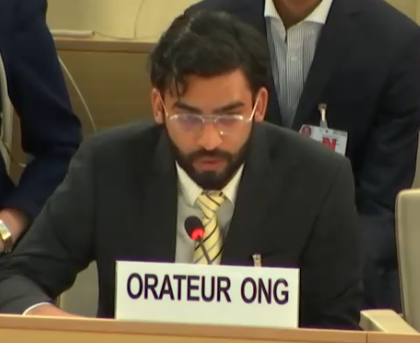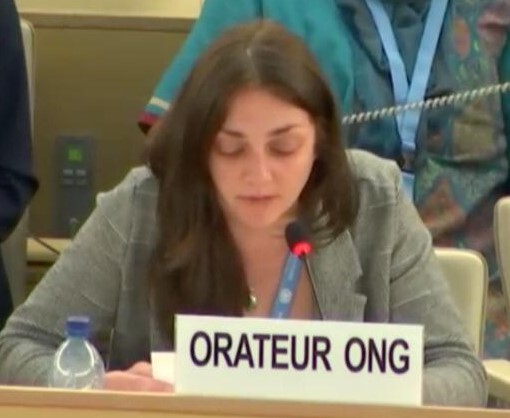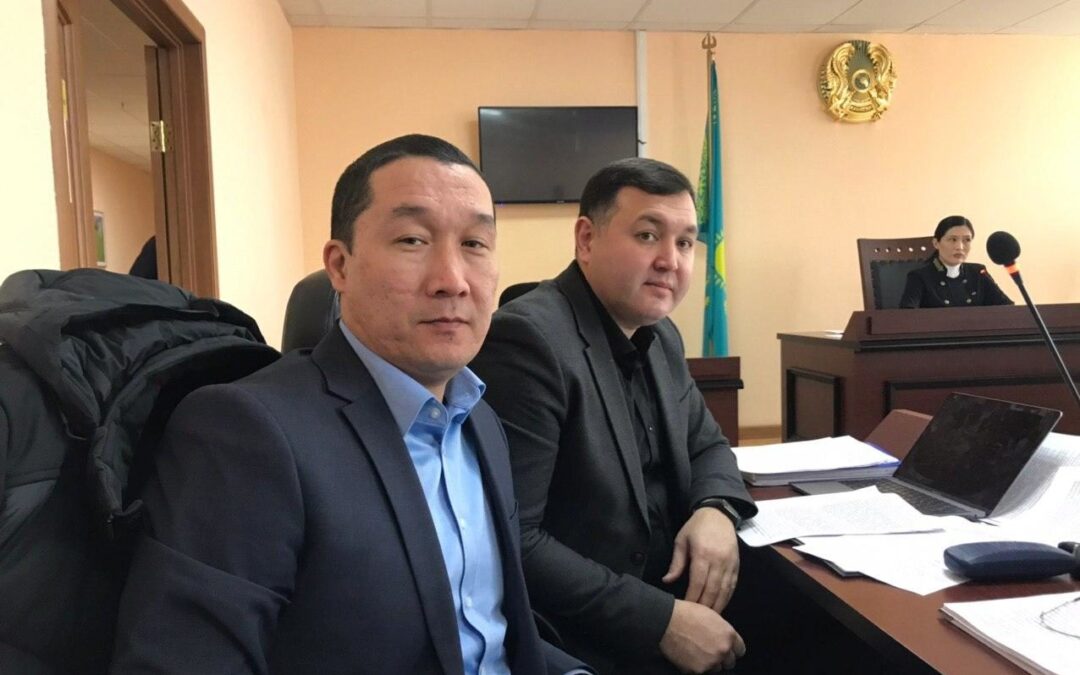
Mar 8, 2020 | News
The ICJ commemorates International Women’s Day by calling on States all over the world to take decisive steps to abolish or amend laws, policies and practices that discriminate against women and girls, including those belonging to Sexual Orientation, Gender Identity and Expression and Sex Characteristics (SOGIESC) minorities.
“All over the world, we are facing increasing attacks on the rule of law, which intensify existing inequalities resulting in compounded and intersecting forms of discrimination against women and girls, especially women from SOGIESC minorities,” said Emerlynne Gil, ICJ’s global focal point on gender.
The ICJ also calls on frontline justice actors, such as judges, lawyers and law enforcement officers, to take proactive steps in eliminating gender discriminatory practices in their work to further enhance access to justice for women.
Such action includes an open and inclusive discourse on regressive interpretations of religious and customary laws that discriminate against women.
The ICJ also urges States to acknowledge the diverse voices of women in this discourse, including those of women who belong to SOGIESC minorities.
“Women and girls, including those from SOGIESC minorities, are at a heightened risk of human rights abuses, most especially because a greater number among them is now living in poverty and is unable to access information about their rights, as well as justice for the violations they suffer,” added Emerlynne Gil.
.International Women’s Day is a symbolic acknowledgement of women’s struggle for gender equality in all spheres of life.
While celebrating the recognition of women’s legal rights and entitlements, the ICJ also notes with deep concern the growing trend around the world to push back on these advances in a manner that fundamentally violates the rights of women.
In 2019, the ICJ adopted the Tunis Declaration on Reinforcing the Rule of Law and Human Rights (Tunis Declaration), wherein it highlighted how “culture, tradition, or religion are being used to justify laws, policies, and practices that discriminate against women and girls”.
The proliferation of these discriminatory laws, policies and practices “come at a time when there is growing inequality, accelerating climate change, conflict, and large-scale displacement of people.”
Upholding cultural practices is often invoked as a convenient excuse to justify the continued existence of laws, policies, and practices that discriminate against women and girls, including those belonging to SOGIESC minorities.
While the ICJ affirms the importance of respecting cultural rights, these must be exercised in a manner consistent with core rule of law principles of non-discrimination, equality and equal protection of the law.
The ICJ notes that claims of cultural preservation are often based upon harmful gender stereotypes and deeply problematic patriarchal norms and attitudes that undergird the sanctification of discriminatory cultural, religious, traditional, and customary norms.
In the Tunis Declaration, the ICJ recognized “the persistent, deep entrenchment of patriarchal culture that perpetuates gender stereotypes in many national and international institutions, including those of the legal profession and judiciary.”
Harmful gender stereotypes, in turn, severely hamper women from enjoying their human rights and from equal access to justice, including for crimes of sexual and gender-based violence perpetrated against them.
Contact
Emerlynne Gil, ICJ Senior International Legal Adviser, email: emerlynne.gil(a)icj.org

Mar 6, 2020 | Advocacy, Non-legal submissions
The ICJ, speaking in a general debate at the UN Human Rights Council in Geneva, urged all States to work together towards adoption of a treaty on business and human rights, and highlighted threats to the independence of the judiciary in Europe.
The statement, delivered in the general thematic debate at the Council, read as follows:
“The International Commission of Jurists (ICJ) welcomes the report of the 5th session of the Intergovernmental Working Group (A/HRC/43/55) in charge of the elaboration of a treaty on business and human rights and notes the consensual nature of its conclusions and recommendations. Abuses of human rights and environmental degradation caused with the involvement of business enterprises have so far been met with very limited action by businesses and States.
The ICJ considers that the revised draft treaty is a serious and advanced proposal that is suitable for negotiations and thanks the Chair-Rapporteur for its efforts and leadership in this process.
The ICJ urges States that are not yet actively involved in the negotiations to join the growing number of States that are active for a final push.
The ICJ also draws the attention of the Council to serious threats to independence of judges and lawyers in European countries.
In Poland, judges are being disciplined merely for applying EU law, under legislation curtailing their freedom of expression and independence.
In Turkey, independence of lawyers and judges continues to be seriously compromised, as demonstrated by the disciplinary proceedings against the Gezi trial judges launched after critical comments by the President of Turkey.
The ICJ urges the Council to give attention to these developments of extreme concern.”

Mar 6, 2020 | Advocacy, Non-legal submissions
Speaking at the UN Human Rights Council, the ICJ today urged States to decriminalize consensual sexual relations, including between people of the same sex.
The statement, delivered during an interactive dialogue with the UN Special Rapporteur on the Right to Privacy, read as follows:
“The ICJ welcomes the report of the Special Rapporteur on privacy, particularly the recommendation to repeal laws criminalizing consensual sexual activity, cluding between people of the same sex.
The ICJ agrees that criminalization of consensual same-sex relations violates international law and standards, including the rights to privacy, non-discrimination and equal protection.
The ICJ advocates for the abolition of laws that criminalize consensual sexual relations – including between people of the same sex – that still exist in many countries around the world.
In Indonesia, for example, a draft Penal Code currently includes a provision that would criminalize “extramarital” sexual acts between consenting persons, including persons of the same sex. We note that the draft provision may superficially appear to be gender neutral because it would penalize both men and women, but studies have shown that, in practice, criminalization of “adultery” and extramarital sexual relations typically results in disparate, discriminatory impacts against women and girls. Malaysia and other States that are former British colonies in Asia, likewise, have similar provisions in their criminal laws penalizing consensual sexual relations.
Like the Special Rapporteur, the ICJ in urges States to repeal laws that criminalize consensual sexual activity – including between people of the same sex.”

Mar 5, 2020 | Новости, Статьи
МКЮ выражает обеспокоенность в связи с решениями Есильского и Сарыаркинского районных судов г. Нур-Султан от 26 февраля о лишении лицензии двух адвокатов, Ерлана Газымжанова и Аманжола Мухамедьярова, по иску Министерства юстиции.
Данные меры наносят удар по способности адвокатов независимо осуществлять свою профессию.
Непосредственным основанием для иска Минюста стало размещение адвокатами в социальной сети фрагментов видеозаписи судебного заседания по уголовному делу, где они выступали в качестве защитников, на которых зафиксировано ненадлежащее поведение судьи. Видео было опубликовано после окончания судебного процесса по делу.
После опубликования видео специализированный судейский орган привлек судью к дисциплинарной ответственности за ее поведение в ходе судебного заседания. В то же время, судебные органы обратились в Министерство юстиции с требованием принять меры в отношении адвокатов за размещение фрагментов видео на их страницах в социальных сетях.
МКЮ осуществляла наблюдение за судебными заседаниями по вопросу о лишении адвокатской лицензии по каждому делу. Оба заседания проходили в надлежащем порядке. Тем не менее, МКЮ была встревожена тем, что пресс-служба Верховного Суда непосредственно в ходе заседания опубликовала комментарий в социальной сети, который вызывает сомнения относительно беспристрастности производства. Более того, председатели Есильского и Сарыаркинского районных судов г. Нур-Султан опубликовали идентичные комментарии, в том числе с точки зрения обоснования решений судей, рассматривавших указанные дела. Это произошло сразу же после оглашения решений сторонам. При этом устные разъяснения решений судьями, председательствующими по делу, отличались от комментариев, размещенных председателями соответствующих судов. В результате производства оба адвоката были лишены лицензии.
МКЮ с обеспокоенностью отмечает, что данные суровые меры в отношении адвокатов не предусмотрены законодательством, устанавливающим ответственность за предположительно совершенные нарушения. МКЮ подчеркивает, что принцип законности требует, помимо прочего, чтобы мера, предусматривающая ограничение прав человека, применялась исключительно в порядке, предусмотренном законом, который должен быть выражен четким и недвусмысленным образом. Требование о том, что подобная мера должна быть предусмотрена законом, отсылает не только к наличию закона как такового, но и к его качеству, т.е. закон должен быть предсказуемым, поскольку норма не может считаться законом, если она не сформулирована достаточно точно, чтобы позволить гражданам регулировать свое поведение: граждане должны иметь возможность предвидеть (насколько это объективно позволяют обстоятельства) возможные последствия своих действий.
Законодательство Казахстана не содержит запрета на опубликование видеозаписи судебного заседания в сети Интернет, не говоря уже о том, чтобы карать подобные действия лишением адвокатской лицензии. Единственным документом, нарушение которого составили действия адвокатов, является внутриведомственный приказ Департамента по обеспечению деятельности судов при Верховном Суде, который не имеет статуса закона и не предусматривает, прямо или косвенно, лишение адвокатской лицензии за опубликование видеозаписи. Ни законодательство, ни Кодекс профессиональной этики адвокатов не устанавливают какого-либо наказания за опубликование видеозаписи судебного заседания в сети Интернет. Таким образом, МКЮ обеспокоена тем, что примененная санкция не была надлежащим образом предусмотрена национальным законом и как таковая является непредсказуемой и нарушает принцип законности.
На основании иска Министерства юстиции о применении конкретной санкции по отношению к адвокатам – лишении адвокатской лицензии – суды рассматривали вопрос о применении только этой санкции. Данная санкция назначается пожизненно. Принимая во внимание правовую неопределенность характера нарушений и серьезные последствия, к которым они привели, данная санкция представляется непропорциональной.
Учитывая наличие механизма обычного дисциплинарного производства в Республиканской коллегии адвокатов, который был введен в действие новым законом об адвокатуре 2018 г., МКЮ обеспокоена тем, что данная процедура не была использована в случае адвокатов, так как иски в их отношении были поданы непосредственно в районные суды. Министерство юстиции не обращалось в дисциплинарные органы коллегии адвокатов, что придает указанным органам адвокатуры бутафорский характер.
«В ходе судебного заседания мы не услышали убедительных доводов по вопросу о том, почему не использовалось обычное дисциплинарное производство в коллегии адвокатов, в том числе в связи с предположительным нарушением адвокатской этики», – заявил Тимур Шакиров, старший правовой советник МКЮ.
«В данных обстоятельствах полномочия коллегии адвокатов по оценке поведения ее члена приобретают решающий характер с точки зрения обеспечения независимости юридической профессии, как этого требует международное право и соответствующие стандарты», – добавил Шакиров.
МКЮ призывает компетентные органы восстановить адвокатские лицензии Аманжола Мухамедьярова и Ерлана Газымжанова. Кроме того, необходимо усилить полномочия коллегии адвокатов с точки зрения различных аспектов ее независимого функционирования, в том числе в рамках дисциплинарного производства, в особенности когда адвокатам грозит лишение лицензии. С этой целью МКЮ призывает Парламент Казахстана пересмотреть действующее законодательство и устранить возможность любого органа исполнительной власти действовать в обход полномочий коллегии адвокатов по оценке профессионального поведения ее членов, в том числе в случае лишения адвокатской лицензии и иного дисциплинарного производства.
Disbarment-of-Mukhamediaov-and-Gazymzhanov-2020-ENG (полный текст документа в формате PDF с общим описанием дела, на англ.)

Mar 5, 2020 | Advocacy, Non-legal submissions
The ICJ today expressed concern at violations of human rights perpetrated in the name of countering violent extremism, and at attempts by some States at the Human Rights Council to dilute its focus on human rights while countering terrorism and the human rights of victims of terrorism.
The statement, delivered during an interactive dialogue with the UN Special Rapporteur on the promotion and protection of human rights and fundamental freedoms while countering terrorism, read as follows:
“The International Commission of Jurists (ICJ) welcomes your report on “Human rights impact of policies and practices aimed at preventing and countering violent extremism” (A/HRC/43/46).
The ICJ shares concern at the growing range of measures that restrict human rights, adopted in the name of the opaque and contested concepts of countering or preventing violent extremism. At the Council, certain States push for agreed language on suppression of terrorism to be cut-and-pasted to apply to “violent extremism”, and then eventually to all “extremism” whether violent or not, without definitions. As your report documents, at the national level this translates into overbroad, unjustified, arbitrary, and discriminatory measures, with particular impacts on civil society, especially human rights defenders, and from a gender perspective.
We also share the view expressed at para 51 of your report, that the current draft report of the Human Rights Council Advisory Committee on “the negative effects of terrorism on the enjoyment of human rights”, remains fundamentally flawed. Any discussion of “effects of terrorism” at the Council should exclusively focus on a human-rights based approach to victims of terrorism, consolidating work already undertaken by successive Special Rapporteurs and other UN and regional entities, as collected in a compilation published recently by the ICJ.[1] The Council must not allow its attention and limited resources to be diverted away from the human rights of victims of terrorism and protecting human rights while countering terrorism, to more diffuse questions of a macro-economic or budgetary character or duplicating work of other bodies.”
[1] See https://www.icj.org/victimsofterrorism2019/ and https://www.icj.org/icj-highlights-rights-of-victims-of-terrorism-to-un-delegations/









